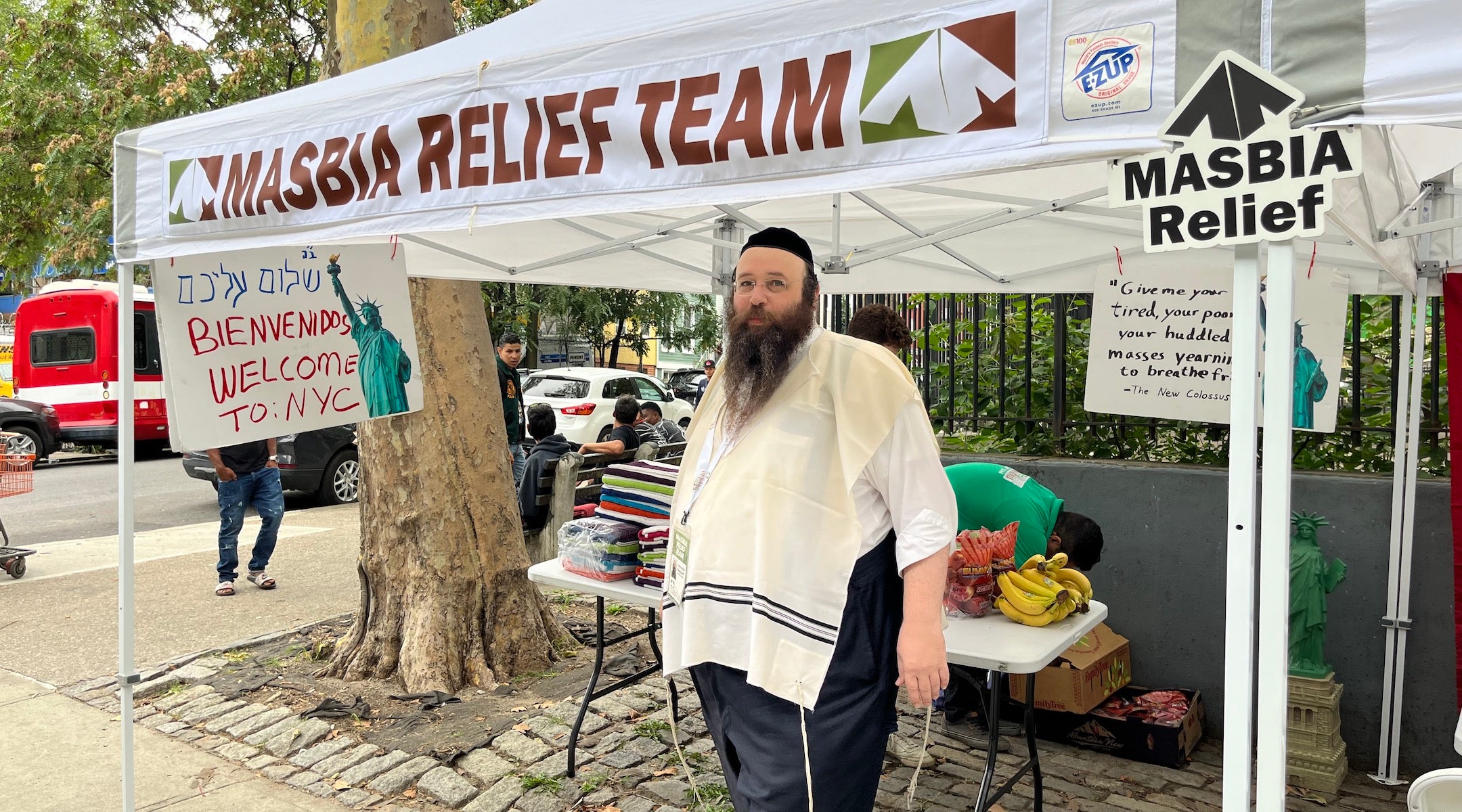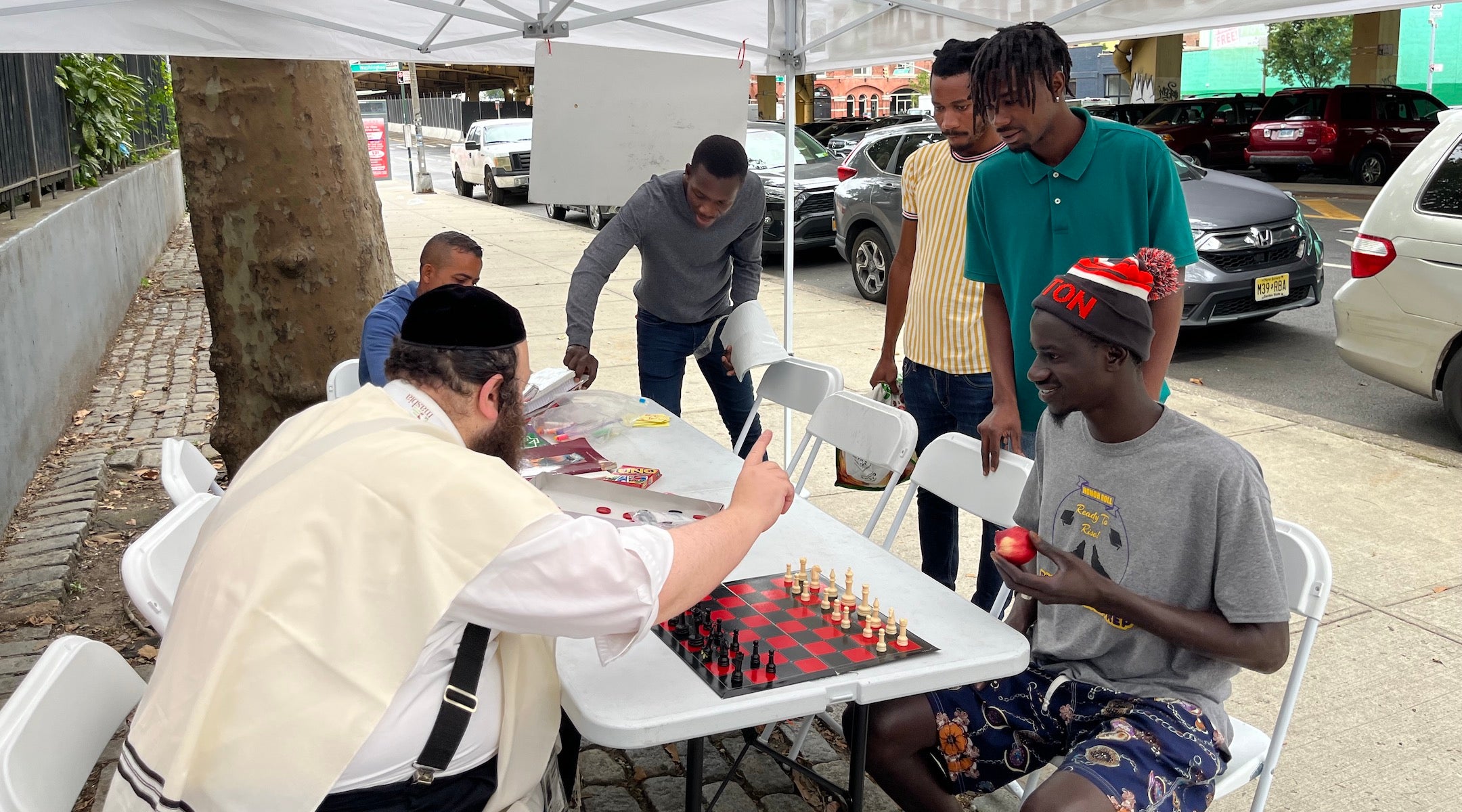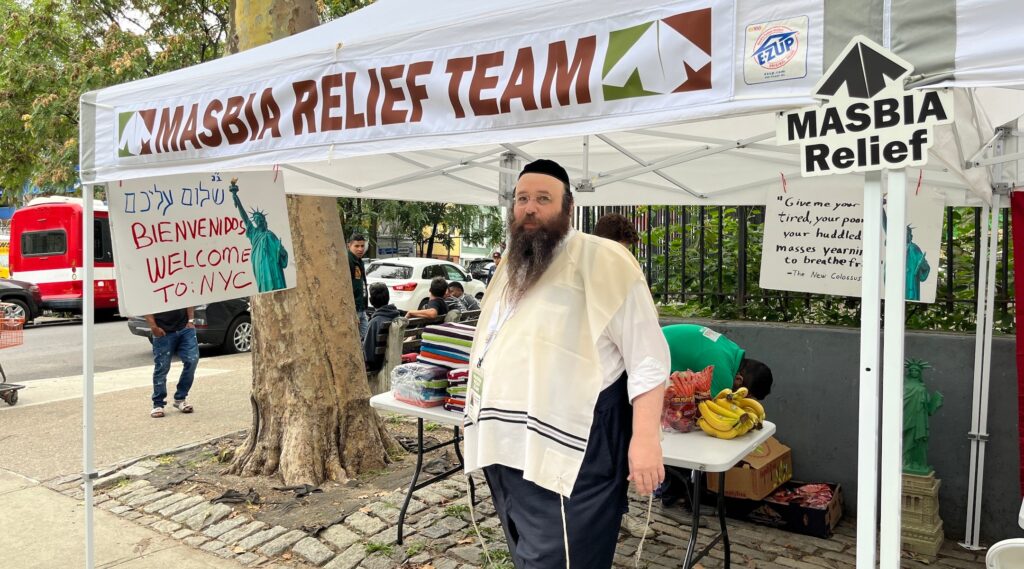[ad_1]
(New York Jewish Week) — Outside a recently opened shelter meant to house some 2,000 migrants at Brooklyn’s Navy Yard, two modest tents are set up where volunteers hand out essentials like food, towels and toiletries, as well as provide items to pass the time, like cards, chess sets and books.
One tent is adorned with an American flag and a sign that reads “Welcome to NYC,” “Bienvenidos” and “Shalom Aleichem.” The other has two lines from “The New Colossus,” the famous poem by Sephardic Jew Emma Lazarus that’s etched into the pedestal of the Statue of Liberty (“Give me your tired, your poor, your huddled masses yearning to breathe free”).
The tents and the free products inside are courtesy of Masbia Relief, a Jewish communal disaster relief team that is an offshoot of the Masbia kosher pantry network founded by Alex Rapaport, an Orthodox Jew in Brooklyn.
“I was raised in a home where all four of my grandparents were Holocaust survivors,” Rapaport told the New York Jewish Week. “There was always that thought: Where was everybody else? Where was the rest of the world when all this was happening? To me, you cannot ignore a situation like this.”
Sign up for our newsletter to get must-read New York stories each day

Alex Rapaport, the executive director of Masbia, has been stocking tents with toiletries, clothes and food outside of the city’s migrant shelters. (Julia Gergely)
Rapaport and his team have been on the ground welcoming new arrivals to New York City since last August, when Texas Gov. Greg Abbott sent his first busload of migrants to Manhattan’s Port Authority Bus Terminal and Masbia greeted them with gifts of free shoes.
Since last spring, more than 100,000 asylum seekers have arrived in New York City, putting a strain on the city’s resources and space. Earlier this summer, the breaking point became visible as hundreds of migrants were forced to sleep on the sidewalk outside the Roosevelt Hotel in Midtown, a makeshift city intake center that had reached capacity.
In response, several emergency housing centers have opened in recent weeks, including large, tent-style shelters set up on soccer fields at Randall’s Island in the East River and in the parking lot at the state-owned Creedmoor Psychiatric Center in Queens. A number of these facilities have opened in Brooklyn, too, including at the Sunset Park Recreation Center, the McCarren Park Play Center and previously vacant space at a block-sized building called The Hall at 47 Hall Street in the Navy Yard.
Mayor Eric Adams has estimated that the influx of migrants will cost the city $12 billion. Over the weekend, pro- and anti-migrant protesters clashed outside Gracie Mansion, and another protest by those opposing the shelter in their neighborhood is planned Monday evening at a former Catholic school on Staten Island.
Yet many New Yorkers remain committed to welcoming the new arrivals. The Synagogue Coalition on the Refugee and Immigration Crisis is a group of 36 synagogues and Jewish non-profit organizations that have come together to present a united front in advocacy efforts, education campaigns and direct volunteer service on behalf of migrants, refugees and asylum seekers in New York. Participating institutions include synagogues B’nai Jeshurun and Ansche Chesed, T’ruah: The Rabbinic Call for Human Rights and the Marlene Meyerson JCC Manhattan.
The coalition, said co-chair Judith Bass, “gives us, as part of the Jewish community, a voice and a presence to express our support for the asylum seekers and the migrants.”
The group was initially formed in 2016 with the support of HIAS, the Jewish immigrant aid society, in response to the Syrian refugee crisis. In addition to traditional resettlement practices — such as aiding refugees in finding apartments and jobs, and helping them fill out government paperwork — coalition members participate in volunteer efforts like greeting migrants and holding food and clothing drives.
“We used to do it because the people who needed help were Jewish and now we do it simply because we are Jewish,” Bass said, referring to how, over the years, HIAS’s mission has shifted from Jews helping Jews to a “multi-continent, multi-pronged humanitarian aid and advocacy organization” according to its website.
Support the New York Jewish Week
Our nonprofit newsroom depends on readers like you. Make a donation now to support independent Jewish journalism in New York.
“There is a ton of activity that’s going on and there is not one single way of helping,” Charlie Davidson, the coalition’s other co-chair, told the New York Jewish Week. One such example is happening Monday afternoon: Volunteers, including former Manhattan borough president and SCRIC co-founder Ruth Messinger, will join Team TLC NYC, another volunteer group, to fill backpacks with school supplies for children of asylum-seekers ahead of the new school year. The initiative will take place at a donation-based, volunteer-run “store” on West 40th Street called the Little Shop of Kindness.
Referencing the Jewish tenet of “welcoming the stranger,” Davidson said that aiding New York’s refugee community is a particularly Jewish issue. “I can’t think of anything that’s more fundamental to who we are than recognizing that these people are in the same place that our grandparents were in when they got here,” he said. “These people are deserving of help and we’re required to provide them help.”
Rapaport said Masbia’s first supplies initiative was put into place on Aug. 5 outside the Sunset Park shelter.
“When we learned that they will be housing migrants in Brooklyn, we wanted to nurture a communal sense of sharing,” he said. “We coordinated with the powers that be to bring two tents outside, where people can pass by and see that we’re collecting personal hygiene and clothing for the people inside [the shelters], and people can express welcoming and good vibes for their new neighbors while they’re here.”
Last Thursday, on an overcast morning, Rapaport and two Masbia volunteers staffed the tents outside The Hall, the new Navy Yard shelter. The trio offered smiles and supplies to dozens of men who came to collect things they needed.

Rapaport plays chess with some of the men who are living at the The Hall in Brooklyn Navy Yard. (Julia Gergely)
Carlos, a 30-something man who declined to give his last name, had arrived from Venezuela six months ago. He took a towel, soap, deodorant and some peaches from the tents. “It hasn’t been going very well at the moment,” he told the New York Jewish Week in Spanish. “I can’t say we’re doing great, but we can’t blame New York for what’s happening. We’re thankful because they help us.”
Like many of his fellow migrants, Carlos said he came to New York seeking asylum from the economic and human rights crisis in Venezuela. He had served nearly two years in jail there for attending a protest against the government. While he was grateful for the toiletries, he said what he most needs is work. Once he gets papers, he hopes to bring his mother and his three kids to the United States as well. “I will do any type of work — whatever is available,” he said. “What I don’t know I will learn quickly. I have no choice.”
“These are people running away from horrors and persecution,” said Rapaport, noting that that fact can get lost in the standoff between the city, state and federal governments over responsibility for alleviating the crisis. “When that happens, it’s very hard to see the human side of the story. It’s very hard for people to understand that there is a real historic thing happening here. It’s a human issue and it’s a New York issue. And we can be welcoming towards new immigrants.”
Bass concurs. “This is a humanitarian crisis, this is not a political issue,” she said. “We need to respond as Jews, as New Yorkers and as concerned individuals.”
[ad_2]
Source link


















